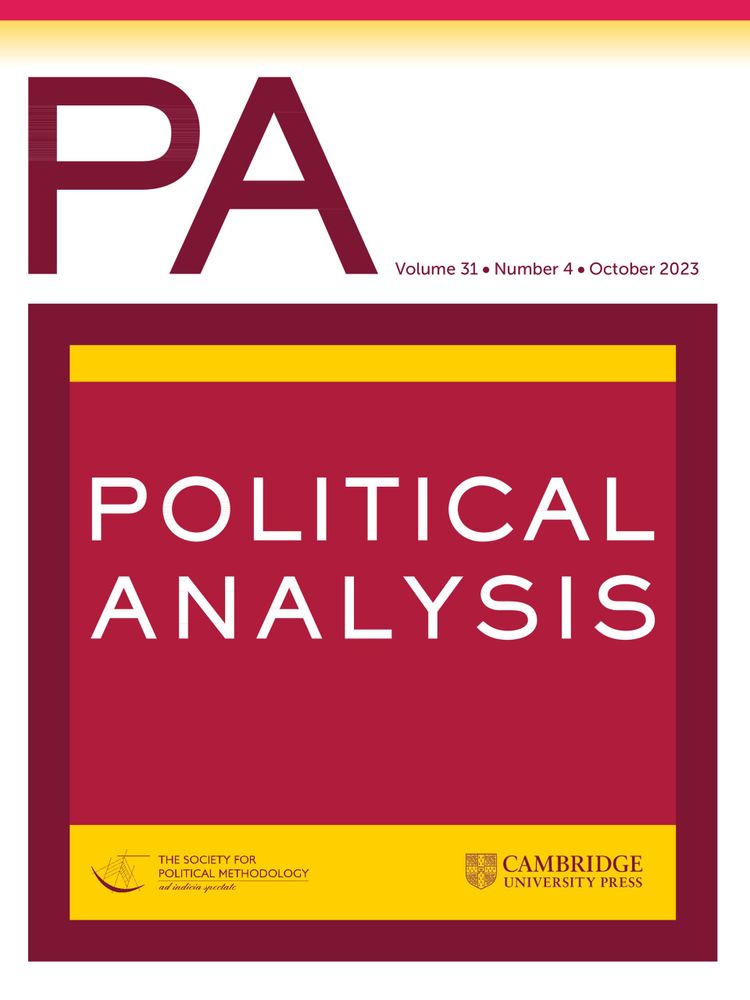
Political Analysis
@polanalysis.bsky.social
Official Journal of the Society for Political Methodology
https://www.cambridge.org/core/journals/political-analysis
https://www.cambridge.org/core/journals/political-analysis
Using House procedural vs final passage votes, the model shows that minority-party members and legislators from moderate constituencies are most likely to shift positions across domains. You can read the full paper here: www.cambridge.org/core/journal...

Explaining Differences in Voting Patterns across Voting Domains Using Hierarchical Bayesian Models | Political Analysis | Cambridge Core
Explaining Differences in Voting Patterns across Voting Domains Using Hierarchical Bayesian Models
www.cambridge.org
November 6, 2025 at 6:05 PM
Using House procedural vs final passage votes, the model shows that minority-party members and legislators from moderate constituencies are most likely to shift positions across domains. You can read the full paper here: www.cambridge.org/core/journal...
This is validated using Arabic-language media published during the Arab Spring. Existing expert-based indices perform less well in stable autocracies, failing to detect short-term or subtle variations in media criticism. You can read the full paper here: www.cambridge.org/core/journal...

Measuring Media Criticism with ALC Word Embeddings | Political Analysis | Cambridge Core
Measuring Media Criticism with ALC Word Embeddings
www.cambridge.org
November 4, 2025 at 5:35 PM
This is validated using Arabic-language media published during the Arab Spring. Existing expert-based indices perform less well in stable autocracies, failing to detect short-term or subtle variations in media criticism. You can read the full paper here: www.cambridge.org/core/journal...
The advantages are validated on a set of appellate decisions. These ideology estimates predict outcomes more accurately than existing appellate measures, and can inform debates on the nature of judicial ideology and decision-making. You can read the full paper here: www.cambridge.org/core/journal...

An Expert-Sourced Measure of Judicial Ideology | Political Analysis | Cambridge Core
An Expert-Sourced Measure of Judicial Ideology
www.cambridge.org
October 30, 2025 at 5:05 PM
The advantages are validated on a set of appellate decisions. These ideology estimates predict outcomes more accurately than existing appellate measures, and can inform debates on the nature of judicial ideology and decision-making. You can read the full paper here: www.cambridge.org/core/journal...
The authors replicate a study on parties’ use of moral foundations and show how different measurements can lead to opposite effect directions. They also offer best practices for studying moral foundations in political texts. Read the full paper here: www.cambridge.org/core/journal...

Moral Foundation Measurements Fail to Converge on Multilingual Party Manifestos | Political Analysis | Cambridge Core
Moral Foundation Measurements Fail to Converge on Multilingual Party Manifestos
www.cambridge.org
October 28, 2025 at 4:35 PM
The authors replicate a study on parties’ use of moral foundations and show how different measurements can lead to opposite effect directions. They also offer best practices for studying moral foundations in political texts. Read the full paper here: www.cambridge.org/core/journal...
The method is demonstrated by extracting agenda items from city council meeting minutes. This workflow can accurately extract subsections of text from a document and required only a few hand labeled documents to train. You can read the full paper here: www.cambridge.org/core/journal...

Detecting Formatted Text: Data Collection Using Computer Vision | Political Analysis | Cambridge Core
Detecting Formatted Text: Data Collection Using Computer Vision
www.cambridge.org
October 21, 2025 at 4:35 PM
The method is demonstrated by extracting agenda items from city council meeting minutes. This workflow can accurately extract subsections of text from a document and required only a few hand labeled documents to train. You can read the full paper here: www.cambridge.org/core/journal...
They use BCCP to forecast fatalities from armed conflicts and demonstrate that it provides well-calibrated uncertainty estimates. The authors also provide guidance and an R package for the BCCP algorithm. You can read the paper here: www.cambridge.org/core/journal...

Bin-Conditional Conformal Prediction of Fatalities from Armed Conflict | Political Analysis | Cambridge Core
Bin-Conditional Conformal Prediction of Fatalities from Armed Conflict
www.cambridge.org
October 17, 2025 at 5:06 PM
They use BCCP to forecast fatalities from armed conflicts and demonstrate that it provides well-calibrated uncertainty estimates. The authors also provide guidance and an R package for the BCCP algorithm. You can read the paper here: www.cambridge.org/core/journal...
The authors replicate existing experiments and find that precision gains from block-randomized or pre-post designs can withstand sample loss that may arise during implementation. You can read the full paper here: www.cambridge.org/core/journal...

Balancing Precision and Retention in Experimental Design | Political Analysis | Cambridge Core
Balancing Precision and Retention in Experimental Design
www.cambridge.org
October 14, 2025 at 4:35 PM
The authors replicate existing experiments and find that precision gains from block-randomized or pre-post designs can withstand sample loss that may arise during implementation. You can read the full paper here: www.cambridge.org/core/journal...
The CPW estimator is demonstrated using a replication of a survey experiment, and shows stronger treatment effects than previously found. This suggests that meaningful effects can be missed using alternative approaches. You can read the full paper here: www.cambridge.org/core/journal...

Estimating the Local Average Treatment Effect Without the Exclusion Restriction | Political Analysis | Cambridge Core
Estimating the Local Average Treatment Effect Without the Exclusion Restriction
www.cambridge.org
October 10, 2025 at 5:05 PM
The CPW estimator is demonstrated using a replication of a survey experiment, and shows stronger treatment effects than previously found. This suggests that meaningful effects can be missed using alternative approaches. You can read the full paper here: www.cambridge.org/core/journal...
While some answers have only a weak semantic connection to questions, they are generally relevant. They also find meaningful correlations between the quality of answers and the party affiliation of the MPs asking the questions. You can read the paper here: www.cambridge.org/core/journal...

Measuring the Quality of Answers in Political Q&As with Large Language Models | Political Analysis | Cambridge Core
Measuring the Quality of Answers in Political Q&As with Large Language Models
www.cambridge.org
October 7, 2025 at 4:35 PM
While some answers have only a weak semantic connection to questions, they are generally relevant. They also find meaningful correlations between the quality of answers and the party affiliation of the MPs asking the questions. You can read the paper here: www.cambridge.org/core/journal...
The authors discuss diagnostic tools to identify problems with estimation methods. Using two applied examples, they recommend researchers consider many estimation methods and model specifications and encourage open reporting. You can read the paper here: www.cambridge.org/core/journal...

What to Observe When Assuming Selection on Observables | Political Analysis | Cambridge Core
What to Observe When Assuming Selection on Observables
www.cambridge.org
October 3, 2025 at 5:05 PM
The authors discuss diagnostic tools to identify problems with estimation methods. Using two applied examples, they recommend researchers consider many estimation methods and model specifications and encourage open reporting. You can read the paper here: www.cambridge.org/core/journal...
Counter to expectations, they find that elites are more likely to schedule an interview when outreach comes from a female alias. This suggests that qualitative interviews may be limited by gender biases. You can read the paper here: www.cambridge.org/core/journal...

Accessibility and Equity in the Research Process: Gender Bias in Elite Interview Recruitment | Political Analysis | Cambridge Core
Accessibility and Equity in the Research Process: Gender Bias in Elite Interview Recruitment
www.cambridge.org
September 30, 2025 at 4:35 PM
Counter to expectations, they find that elites are more likely to schedule an interview when outreach comes from a female alias. This suggests that qualitative interviews may be limited by gender biases. You can read the paper here: www.cambridge.org/core/journal...
(2/2) @zengchen.bsky.social, @eliasdinas.bsky.social, @redatamtam.bsky.social, and more! Most papers are currently open access. You can read the new issue here: www.cambridge.org/core/journal...

Political Analysis: Volume 33 - Issue 4 | Cambridge Core
Cambridge Core - Political Analysis - Volume 33 - Issue 4
www.cambridge.org
September 29, 2025 at 3:45 PM
(2/2) @zengchen.bsky.social, @eliasdinas.bsky.social, @redatamtam.bsky.social, and more! Most papers are currently open access. You can read the new issue here: www.cambridge.org/core/journal...
This method tightens non-parametric partial identification bounds in settings where outcomes are endogenously missing, enabling more informative and assumption-agnostic inference about treatment effects. You can read the full paper here: www.cambridge.org/core/journal...
Generalizing Trimming Bounds for Endogenously Missing Outcome Data Using Random Forests | Political Analysis | Cambridge Core
Generalizing Trimming Bounds for Endogenously Missing Outcome Data Using Random Forests
www.cambridge.org
September 23, 2025 at 1:55 PM
This method tightens non-parametric partial identification bounds in settings where outcomes are endogenously missing, enabling more informative and assumption-agnostic inference about treatment effects. You can read the full paper here: www.cambridge.org/core/journal...

